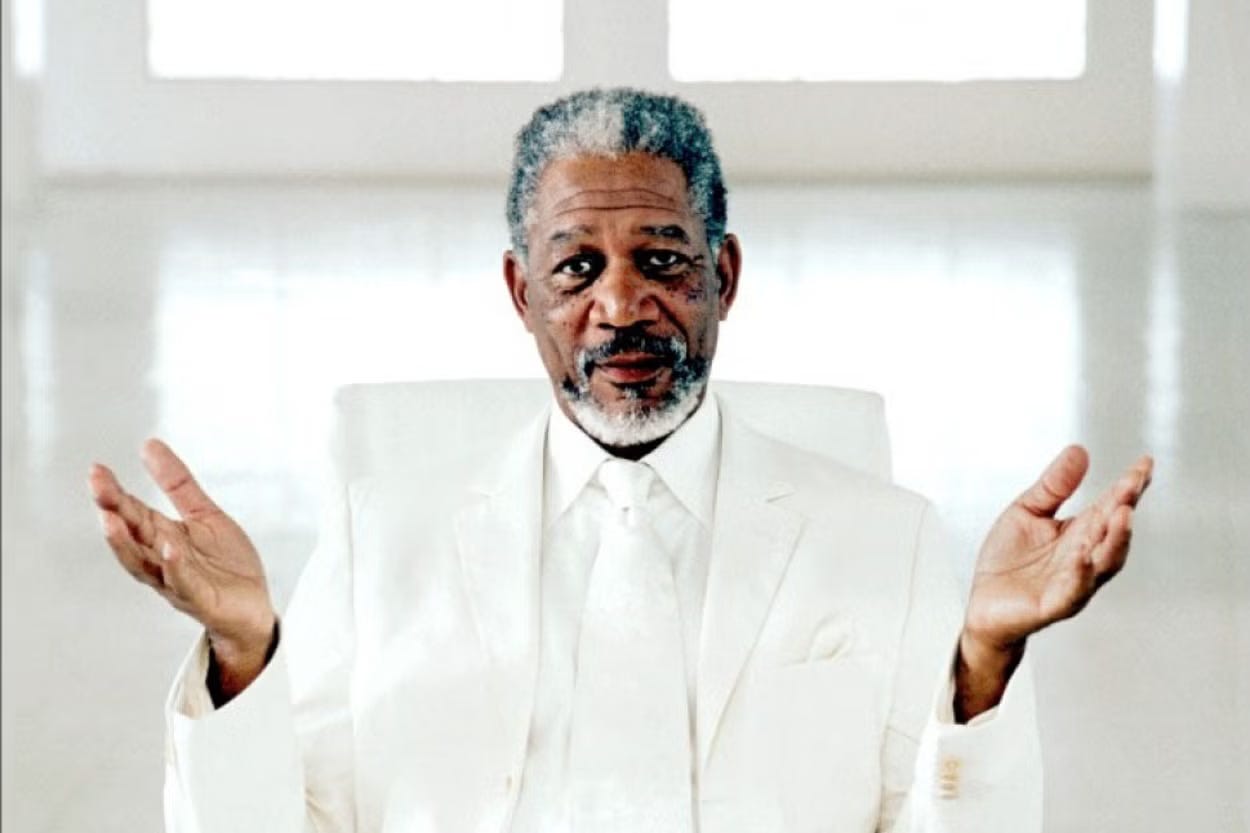People, be they religious or spiritual, atheist or agnostic, seem to have some pretty firm ideas about who God is. Here are a few that might sound familiar:
1) God is an angry man who controls our lives.
2) God is the figment of an over-active imagination.
3) God is everything and everywhere, always.
4) God is a psychological crutch for weak-minded people.
Perhaps one of these stories chimes with your own perspective. Growing up as a Potterhead, I’m happy to admit that I viewed God as an Albus Dumbledore figure; wise and all-knowing, but also prone to unpredictable, angry outbursts1.
Anyone raised within a Jewish or Christian tradition will be familiar with the notion of an ‘angry God’. In the Hebrew Torah/Christian Old Testament, there are countless instances of God having very human emotions; being jealous, angry and vengeful. In the book of Samuel, for example, the ‘Lord Almighty’ instructs the Israelites to ‘totally destroy’ the Amalekites, and to ‘put to death men and women, children and infants, cattle and sheep, camels and donkeys’. Nice, right? So nice, in fact, that Benjamin Netanyahu has sought to conflate the story of Amalek with his war on Gaza, saying things like: ‘You must remember what Amalek has done to you, says our Holy Bible. And we do remember.’ By doing this, Netanyahu has aligned himself with those on the far-right of Israeli politics who equate the people of Amalek with modern-day Palestinians.
When we think about God in these terms, it’s easy to understand why so many of us choose to have nothing to do with religion. Who in their right mind would willingly associate themselves with such a nasty and vindictive supernatural force, one who can so easily be invoked to commit unthinkable crimes against humanity?
, editor of Jewish Currents, has argued that the way in which Netanyahu has tried to link the story of Amalek to the Palestinian people runs counter to a rabbinical tradition which no longer seeks to identify the Amalekites. In an email to Mother Jones, Beinert wrote that by ‘claiming that he knows who Amalek is, [Netanyahu] is undoing the moral scaffolding created by Jewish tradition and asserting a Biblical literalism that is alien to the Judaism of the last two thousand years and, given the military power at his disposal, is frankly terrifying.’Cynics among you might think that the word ‘literalism’ is doing plenty of heavy-lifting in Beinart’s argument. To what extent are the stories we’re told about God to be viewed as metaphors rather than literal truths? You might wonder. If everything is just a ‘story’ then what’s the point in having and practising a particular faith? These are all good questions. Questions I won’t pretend to have the answers to.
Here’s one thought though. I’m increasingly of the view that our understanding of who God is, and who (or what) God isn’t matters. It matters because if you’ve been raised believing that God is simply an angry entity always out to get revenge against your oppressors, then the way you move and act and exist in the world will reflect that. You might spend your days feeling scared and righteous in equal measure, denouncing the mere presence of another group as an existential threat.
Similarly, if you’ve only ever associated God with male-pronouns but went on to be abused by male leaders within your religious community, you are probably going to experience some pretty intense psycho-spiritual trauma. In the Christian world, a very influential evangelical preacher called Mike Pilavachi has been identified as being psychologically abusive and sexually inappropriate towards young men and women in his care. But if God is always coded as a male authority-figure, where does that leave Mike Pilavachi’s victims vis-a-vis God? How on earth do they begin to heal from a scenario like that?
The God that interests me these days, the one who holds my attention, is the God I find in the places I expect to find her the least. She speaks to me through episodes of a children’s TV show about a dog called Bluey. (I am Bluey). She also turns up at a monthly zoom call called ‘Bangers and Mass’, where a group of thirty-somethings share their questionable taste in music. I hear her in the weekend-debrief voice notes my friend Lauren leaves me most Monday mornings, and in a parents WhatsApp group where we chronicle the highs and lows of toddlerdom together. She makes me laugh, and is with me when I cry.
Of course, she’s in poetry and art and all those sophisticated places too. But for now, she knows I don’t even have a Mary Oliver-level of literary bandwidth. So instead, God meets me in places of low-pretension. I actually like her better there.
In Bruce Almighty, God takes the form of Morgan Freeman, who decides to temporarily imbue a struggling Bruce with divine powers. Upon meeting God in multiple guises, Bruce thinks the whole thing is some elaborate joke. ‘This is hilarious’ he says ‘so you’re the boss, and the electrician and the janitor! Must be a killer Christmas party. Don’t get drunk though-one of you might need a lift home’. This multivarious (or trinitarian) view of God, who is the boss, electrician and janitor, is one I can get on board with. It speaks of a God who is never static, but always shapeshifting, in order to try and be close to us.
The psychoanalyst Carl Jung created the language of archetypes to describe the numerous characters that manifest in human narratives. Novelists and marketeers alike have long deployed Jungian archetypes like the ‘Sage’, ‘Explorer’, ‘Hero’ and ‘Magician’ in order to typify particular aspects of the human condition. The ‘Jester’, uses wit and satire as ways of connecting with and discovering joy alongside people - they are the Tina Feys, Joe Lycetts and Robin Williamses of our world. But might it also be possible that the God who created the heaven and the earth in six days, and then took a day off as a flex, also falls into this category?
What am I getting at here? I guess I’m suggesting that we hold the preconceptions we have about God lightly, and avoid what the Nigerian novelist Chimamanda Ngozi Adiche describes as ‘the danger of a single story’. ‘The single story creates stereotypes’, she argued in her 2009 TED talk, ‘and the problem with stereotypes is not that they are untrue, but that they are incomplete. They make one story become the only story.’
So may you allow God to surprise you.
May you come to recognise the Jester God, Creator God and the Outlaw God, who are one and the same.
And may you allow God, who is infinite in her (dis)guises, to speak to you in the way you need hear her right now.
In the name of our Mother, Daughter and Ultimate Drag-Queen,
Amen
Recommendation Corner: Divine Depictions Edition
The Bear, Season 2 episode 7 ‘Forks’: Olivia Coleman makes a brief but heavenly cameo as Terry in this episode of the much-acclaimed culinary TV series. The scene consists of her standing there, peeling mushrooms, and sharing her philosophy on fine-dining and failure. I think it captures what the theologian Andrew Cunning describes as the ‘theology of the ordinary’.
Rev, Season 3 episode 5 : Liam Neeson (looking eerily like Murmuration reader Martin Wroe) makes a cameo as the Lord of the Dance in this dramatic episode of Rev, which follows the ministry of inner-city Priest Adam Smallbone.
The Matrix Trilogy: Gloria Foster and Mary Alice Smith share the role of a cookie-baking, candy-offering ‘Oracle’ in the Matrix franchise. ‘Everything that has a beginning has an end. I see the end coming. I see the darkness spreading. I see death. And you are all that stands in his way.’
You might have missed:
befriending our mortality
Hello there, Thanks for choosing to read this newsletter. For those of you getting this for the first time, welcome. My name is Grace Pengelly: I’m a writer, editor and new(ish) parent. I hit send on The Murmuration every other Thursday, writing on culture, books and (invariably), my life. My wonderful paid subscribers a…
little altars everywhere
In an unsuspecting house in Cambridge there is an art gallery called Kettle’s Yard. It was once the home of Tate curator Jim Ede and his wife Helen, who decided to knock through the four small cottage to create an unusually conceived space. The plan was that it woul…
Thank you for reading. The Murmuration is a biweekly newsletter written by Grace Pengelly. Its existence is reliant on paid subscribers, so if you enjoyed reading please consider upgrading your subscription or forwarding this email on to a friend!
Michael Gambon controversially leaned into this volatile portrayal of the Hogwarts headmaster, which many Potter die-hards deemed out of step with the Rowling’s fictive world. I mean, who cares at this point! Rowling should read this essay.








The Liam Neeson, unhinged homeless guy God is a scream, but also deeply touching. I love that scene so much.
'I actually like her better there' - I loved this piece, Grace. It raises so many important questions around how we perceive God that are worth engaging with because yes, it really does matter! Your blessing at the end is just perfect.